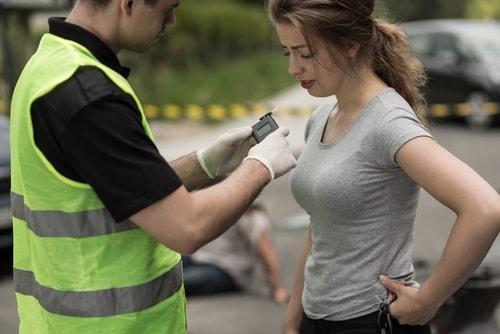What You Need to Know About Refusing to Take a Breathalyzer
 When a police officer has a reason to suspect that you are driving under the influence of alcohol, the officer may ask to submit to a blood alcohol content (BAC) test. These tests are usually conducted during a traffic stop. The stop may have been initiated based on a minor traffic violation or erratic driving, but if something during the stop triggers the officer’s suspicion, the request for a BAC will usually follow.
When a police officer has a reason to suspect that you are driving under the influence of alcohol, the officer may ask to submit to a blood alcohol content (BAC) test. These tests are usually conducted during a traffic stop. The stop may have been initiated based on a minor traffic violation or erratic driving, but if something during the stop triggers the officer’s suspicion, the request for a BAC will usually follow.
The most common type of BAC test—and the easiest to conduct—is a breath test. BAC breath tests are usually known simply as "breathalyzer" because of a particular brand of testing machine that has become synonymous with the test. You probably know that if you blow a 0.08 or higher on your breathalyzer, you are considered to be statutorily intoxicated and can be charged with driving under the influence (DUI). But, do you have to take the test when you are asked to do so?
Preliminary Testing
There are several points during the course of a stop and potential arrest when the officer could ask you to take a breathalyzer. The first is a preliminary test. Preliminary testing is a way for the police to develop a full understanding of the situation and to establish probable cause—if there is any—for an arrest. The officer will usually ask about preliminary breathalyzer while you are still sitting behind the wheel.
You have every right to refuse a preliminary breathalyzer with no direct consequences. Keep in mind that if you say no, the officer may look a little harder for other signs that you are intoxicated, such as trouble focusing and slurred speech. There are many ways for the officer to establish probable cause, and the breathalyzer is only one of them.
When You Are Arrested
If the preliminary investigation gives the officer enough probable cause to arrest you on suspicion of DUI, you will be asked to submit to a breathalyzer again—or a blood or a urine test, alternatively. This time, the test will be conducted at the police station. Refusing to take the test at this point will result in the suspension of your driving privileges for one year. The suspension is three years if you were arrested and refused previously.
It is important to keep in mind that failing a BAC test after your arrest will result in a six-month license suspension for a first offense and one year for a subsequent offense. A failed test also gives prosecutors quantitative evidence that you were intoxicated. This means that there is a potential upside to refusing the test. Without the evidence of a failed test, it may be harder for prosecutors to prove that you were under the influence, though your refusal can be used against you.
Let Us Help
If you have additional questions about the DUI laws in Illinois, contact an experienced Kane County DUI defense attorney. Call 847-488-0889 for a free consultation at The The Law Office of Brian J. Mirandola today.
Sources:
http://www.ilga.gov/legislation/ilcs/fulltext.asp?DocName=062500050K11-501.1
https://www.cyberdriveillinois.com/publications/pdf_publications/dsd_a118.pdf







